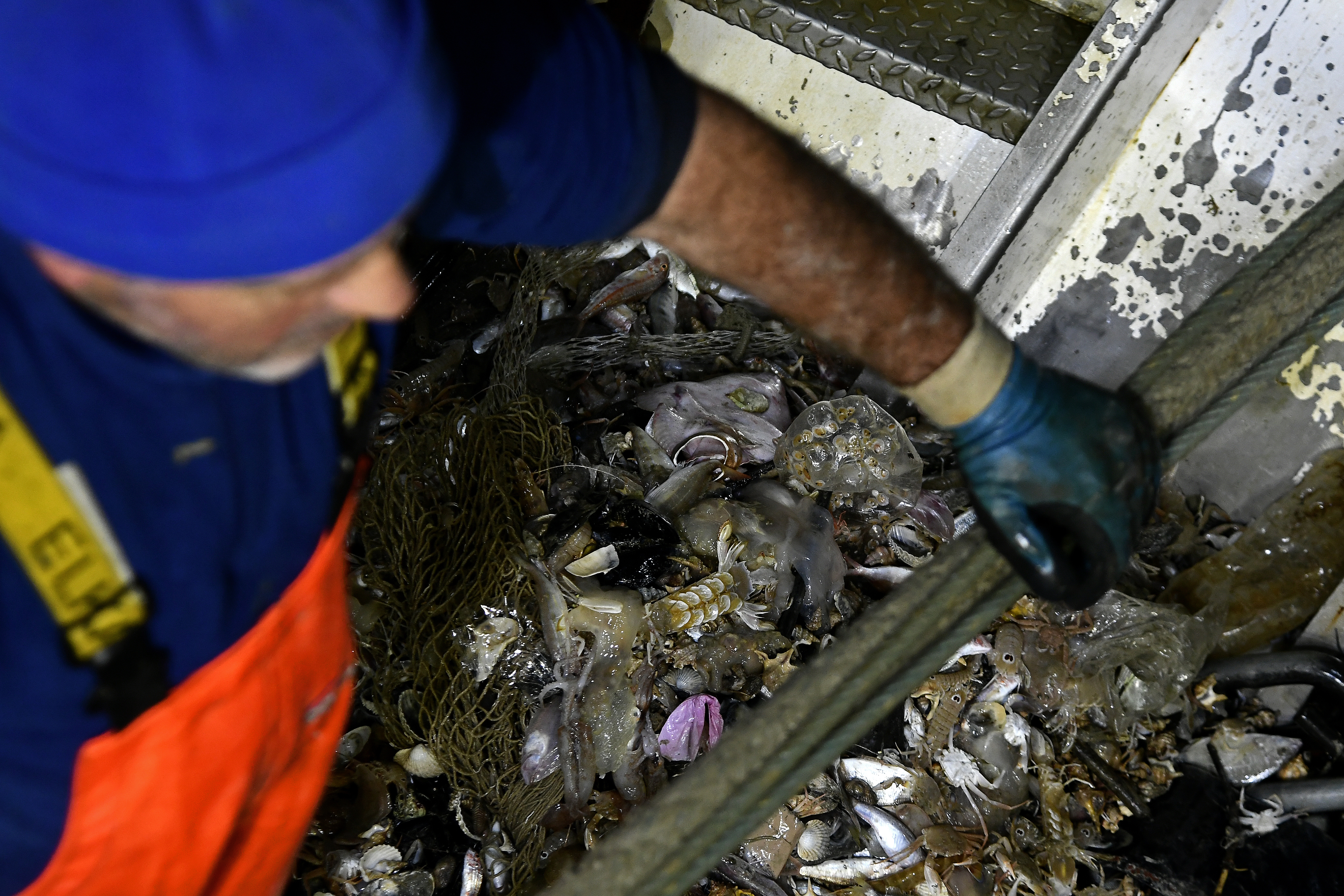Fishermen help overhaul plastic habits off Italy

In this photograph taken on May 23, 2019, a fishermen recovers plastic waste from a fishing net onboard a fishing boat off the coast of San Benedetto del Tronto. – On a moonlit night off Italy’s coast, fishermen are hauling in the usual catch: cuttlefish, red mullet and plastic waste. But this time, they won’t throw the rubbish back. The trash instead is being collected, analysed and, where possible, recycled in a month-long experiment to try to provide a blueprint for cleaning up the sea. (Photo by Filippo MONTEFORTE / AFP)
SAN BENEDETTO DEL TRONTO, Italy — On a moonlit night off Italy’s coast, fishermen are hauling in the usual catch: cuttlefish, red mullet and plastic waste. But this time, they won’t throw the rubbish back.
The trash instead is being collected, analyzed and, where possible, recycled in an initially month-long experiment to try to provide a blueprint for cleaning up the sea.
“A lot of the fishermen used to throw the rubbish back into the sea, because the law says they can’t bring it to land,” said Eleonora de Sabata, coordinator for Clean Sea Life, which runs the project.
“They’re not authorized to carry waste, in ports there’s nowhere to put this kind of waste and it’s not clear who should dispose of it.”
That dilemma will hopefully not be an issue for the around 40 fishing boats sailing off the Adriatic resort of San Benedetto del Tronto who are taking part in the initiative.
Since it started, the fishermen have collected around a ton of waste a week for a month, of which 60 percent is plastic.
Each day, volunteers catalogue and sort the smelly catch on the quayside.
Some is recycled, some is disposed of along with household or industrial waste, but none goes back in the sea.
The project had been due to wrap up on June 7, the day before World Oceans Day, but has now been extended through the summer months.
Organizers hope it will offer waste management solutions that can be scaled up for the rest of Italy and beyond.
– Plastic jumble –
Much of the rubbish is single-use, such as bottles, plates and cutlery, but also includes old nets from fishing or mussel farming and assorted random plastic objects, from medical products to fax machine parts.
Fisherman Claudio Uriani, 62, sorts the catch into different buckets, ready to be sold at market.
The most voluminous species is the plastic, though.
“Let’s say we didn’t always collect it. There didn’t used to be anyone on land to take the plastic,” said Uriani, who’s been fishing since 1972.
“If the fish eat plastic, they get sick, and so we also can get sick.”
The Mediterranean Sea faces the additional problem of being a virtually closed body of water surrounded by dense human populations.
A study by the peer-reviewed Public Library of Science (PLOS) published in 2015 estimated that the Mediterranean contains 1,000-3,000 tons of floating plastic, with an unknown quantity on the seabed.
The Nile river delivers at least 1,500 tons of plastic into the Med annually, according to the PLOS study.
Sperm whales wash up regularly on Italian beaches, their stomachs full of plastic.
“The rubbish that ends up in the sea all comes from people, from lakes and rivers, it’s essential to educate people that what they put in the water ends up in the sea,” said harbor master Mauro Colarossi.
‘Political decision’
In March European lawmakers approved a new law banning single-use plastic products in the EU from 2021.
A draft bill is also before the Italian parliament on the handling of existing waste.
Under current laws, if fishermen opt to retrieve and dispose of the rubbish they pull in with their catch they could face prosecution for illegally transporting it.
“If fishermen provide a service to the community by bringing this waste to land, it shouldn’t be them who have to pay,” said Colarossi.
It’s estimated that 80 percent of waste in the sea comes from land and 20 percent from boats and the fishing industry.
“The value of this experiment is to find out what’s on the seabed, understand how much is recyclable and how to manage this waste,” said De Sabata.
“All this information will help decision-makers to take a political decision and so continue.”
So far up to a quarter of all the waste retrieved was recyclable, depending on whether the polymers in the plastic were still in good enough condition after being in salt water, De Sabata said.
‘Alarm to action’
The pollution problem is not just about preventing plastics entering the food chain.
If a tin of paint is brought up in the nets from 100 meters (328 feet) below, the whole catch is tainted and must be thrown away.
Likewise, fishermen tell of getting so much plastic in their nets that it stops them being able to catch fish.
“The problem is in the sea but the solution is and should be on land. There needs to be a political solution, we need to go from alarm to action,” said De Sabata.
As the ship returns to port after a night of trawling, the fish and the waste are unloaded onto the quayside.
“If we did this for a year instead of a month, the sea would be clean,” said captain Stefano Voltattorni, heaving yet another crate onto the dock. /muf